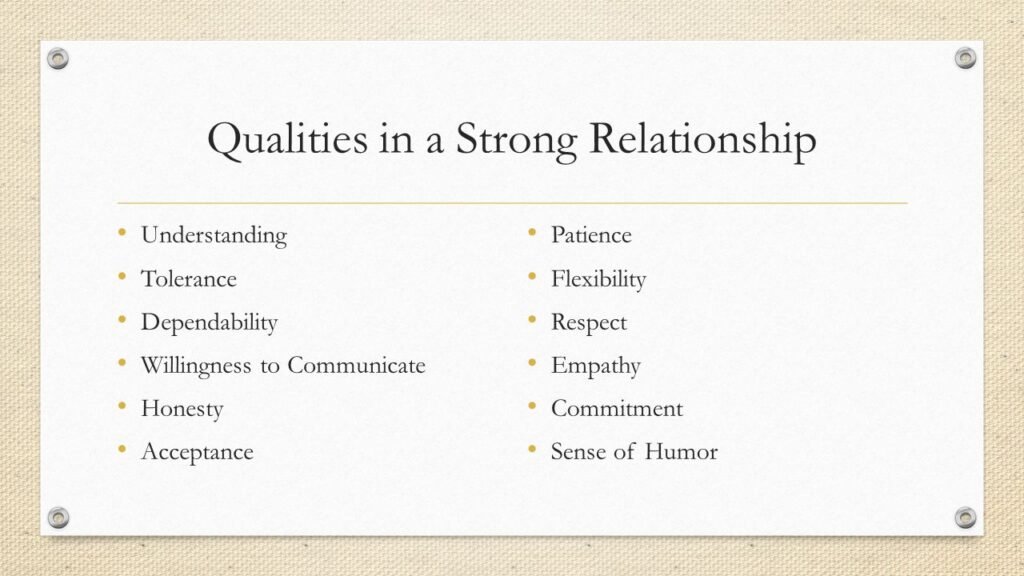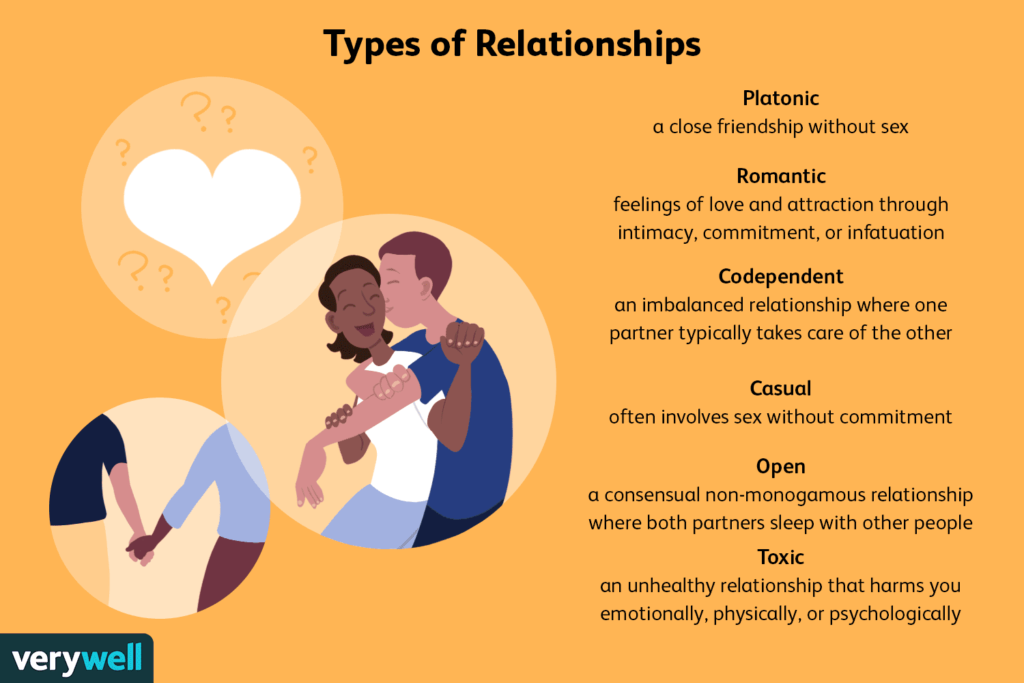Relationships are at the core of human happiness and fulfillment.
A strong, healthy relationship isn’t just about spending time together—it’s built on deep qualities that form the foundation of a lasting connection.
Here, we’ll discuss the top 10 qualities that define a strong relationship and provide tips on how to nurture these qualities in your own life.
Top 10 Myths About Relationships That Could Be Holding You Back

1. Trust
Trust is the foundation of any relationship. When two people trust each other, they feel secure and safe. This allows them to be vulnerable and open with each other, leading to a deeper connection.
- Why It’s Important: Trust enables partners to rely on each other, fostering a safe space for sharing thoughts, feelings, and experiences.
- How to Build It: Keep your promises, communicate honestly, and show reliability in both small and big matters.
2. Communication
Effective communication is crucial to resolving conflicts, understanding each other’s needs, and preventing misunderstandings. It involves not just talking, but also actively listening.
- Why It’s Important: Clear communication reduces the risk of misunderstandings and increases emotional intimacy.
- How to Improve It: Practice active listening, be open about your feelings, and avoid interrupting your partner.
Top 10 Secrets to a Lasting Relationship

3. Respect
Respect is about valuing each other’s thoughts, feelings, and beliefs. It means accepting differences and treating each other with kindness, even during disagreements.
- Why It’s Important: Mutual respect fosters equality and prevents one person from feeling undervalued.
- How to Show It: Honor your partner’s boundaries, avoid harsh criticism, and practice empathy.
4. Support
Supporting each other through life’s ups and downs strengthens your bond. This means being there not only in times of need but also celebrating each other’s successes.
- Why It’s Important: Emotional support increases resilience and helps both partners achieve their goals.
- How to Show Support: Listen to each other’s needs, offer help during tough times, and celebrate achievements together.
5. Honesty
Honesty promotes openness and transparency, reducing insecurities and fears within the relationship. When you’re honest, your partner can trust you and feel secure.
- Why It’s Important: Honesty prevents misunderstandings and builds trust over time.
- How to Be Honest: Share your true thoughts and feelings, admit when you’re wrong, and avoid hiding things from your partner.
10 Ways to Tell If a Boy Is Shy but Likes You

6. Compromise
Every relationship involves a balance of give and take. Compromise helps resolve differences, allowing both partners to find solutions that respect their needs.
- Why It’s Important: Compromise prevents conflicts from escalating and shows that each person values the other’s happiness.
- How to Compromise: Practice empathy, avoid a win-lose mindset, and be willing to meet halfway.
7. Shared Goals and Values
Having common goals and values can make it easier for couples to work together towards a shared future. When partners align on what’s important, they’re more likely to have a harmonious relationship.
- Why It’s Important: Shared values provide a strong foundation and reduce conflicts on important life decisions.
- How to Develop Shared Goals: Discuss your future goals openly and make plans that consider both partners’ aspirations.
8. Emotional Intimacy
Emotional intimacy means feeling close to each other on a deeper level. It’s the result of vulnerability, openness, and understanding that goes beyond physical attraction.
- Why It’s Important: Emotional intimacy creates a bond that fosters security and satisfaction.
- How to Increase Emotional Intimacy: Share your personal dreams, fears, and experiences, and make time for meaningful conversations.
9. Independence
While togetherness is crucial, independence allows each partner to maintain their individuality. Strong relationships thrive when both people feel free to be themselves.
- Why It’s Important: Independence prevents codependency and encourages personal growth, which can benefit the relationship.
- How to Maintain Independence: Pursue your own interests, set personal goals, and respect your partner’s need for personal time.
Top 10 Myths About Relationships That Could Be Holding You Back

10. Forgiveness
Forgiveness allows partners to move past mistakes and hurtful situations. Holding onto grudges can damage trust and create resentment over time.
- Why It’s Important: Forgiveness fosters healing, allowing partners to focus on the future rather than past mistakes.
- How to Practice Forgiveness: Address issues openly, avoid bringing up past mistakes, and commit to moving forward.
Frequently Asked Questions (FAQs)
1. Why is trust so crucial in a relationship?
Trust allows partners to feel secure and open, making it possible to build a strong, honest connection. Without trust, insecurities and doubt can weaken the bond.
2. How can I improve communication with my partner?
Practice active listening, share your thoughts openly, and avoid interrupting. Regular check-ins can also help you stay connected.
3. What if my partner and I have different values?
It’s possible to have a successful relationship with different values as long as both partners respect each other’s beliefs and find common ground on core issues.
4. Is it healthy to compromise in every situation?
Compromise is key to a balanced relationship, but it’s also important to know your non-negotiables. Healthy relationships find a balance without compromising core values.
5. How do I build emotional intimacy?
Spend quality time together, have meaningful conversations, and be vulnerable about your feelings and dreams to deepen your emotional connection.
6. Why is independence important in a relationship?
Independence allows each person to grow individually, which can make the relationship stronger by fostering respect and admiration for each other’s uniqueness.
7. How do I practice forgiveness in a relationship?
Start by addressing the issue openly, avoid bringing up past conflicts, and make a conscious choice to move forward.
8. How can we develop shared goals as a couple?
Discuss your aspirations and priorities openly, and find common goals that align with both of your values and dreams.
9. What does it mean to support each other emotionally?
Emotional support involves being there for each other, listening to one another’s struggles, and offering encouragement during difficult times.
10. How do I know if my relationship is strong?
A strong relationship will feel secure, loving, and supportive. You’ll feel understood, respected, and free to be yourself while sharing a deep connection with your partner.